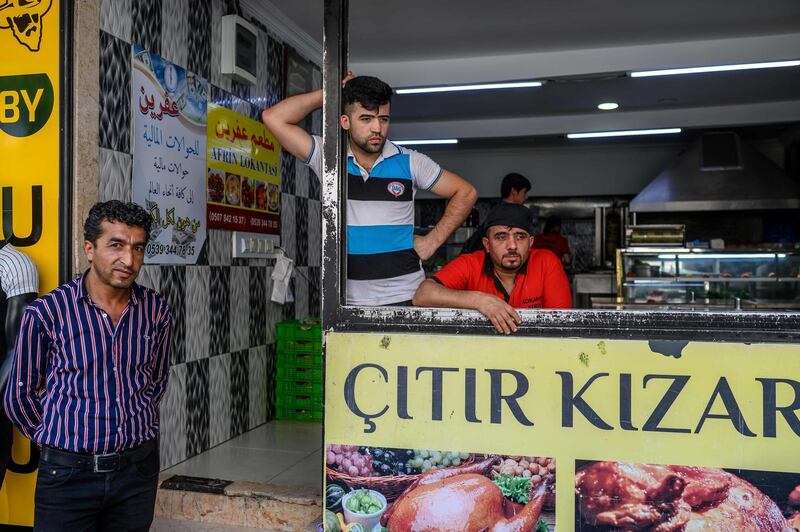A senior official of Syria's labour ministry has lashed out at the poor treatment of citizens working in neighbouring countries where they sought refuge from the country's brutal civil war.
The comments by Mahmoud Al Kawa, director of the ministry's labour market watchdog, are a rare acknowledgement of the mounting hostility faced by Syrian refugees.
Mr Al Kawa told Syrian daily Al Watan last week that "the ministry strives to face all challenges that face Syrian workers in neighbouring countries".
He also urged Syrians to come home to take part in the rebuilding of its battered infrastructure after eight years of war and get away from the “violations” committed against them abroad. According to the UN. 5.6 million Syrians have fled to Turkey, Lebanon, Jordan, Iraq and Egypt.
Mr Al Kawa did not name any particular country, but Nasser Yassine, director of research at the Issam Fares Institute for Public Policy and International affairs at the American University of Beirut, said his comments were a response to reports of increased harassment of Syrians in Lebanon and Turkey.
“I’m not sure they can do anything about it, but they need to save face,” Mr Yassine said.
Syrians in Lebanon and Turkey say they have never received support from their embassy. The Syrian embassy in Beirut did not respond to The National's to questions about its services for Syrian workers.
“There is really no position of strength Damascus can use when standing up for the rights of its workers abroad,” said British-Syrian analyst Danny Makki.
“There are no firm mechanisms or measures it can put in place to stop the mistreatment of Syrian workers abroad.”
According to Sami Nader, director of the Levant Institute for Strategic Affairs in Lebanon, Mr Al Kawa’s call for Syrian refugees to return is an attempt to legitimise the Syrian government as it emerges victorious from eight years of civil war.
“It’s very ironic that a regime that has abused its own people wants to show that it cares,” he said. “But putting the issue of reconstruction on the table is a way to engage with the international community again by presenting itself as the legitimate representative of Syrian people,” he said.
Syrian refugees have come under increasing pressure in Lebanon.
The labour ministry has launched a campaign to stop the illegal hiring of foreign workers, most of whom are Syrian. Labour Minister Camille Bou Sleiman said only 1,733 Syrians have valid work permits. There are nearly one million Syrian refugees registered with the UN in Lebanon, roughly one quarter of the country's population.
“Our aim is to give the priority to Lebanese employees," Mr Bou Sleiman said on Wednesday. “The ministry’s doors are still open for companies that want to fix their foreign employees’ situation.”
Mr Bou Sleiman spoke after labour inspectors toured several areas of Beirut, Saida and Tripoli. The y shut 20 businesses and issued 129 fines and 24 warnings. Lebanese employers prefer not register their Syrian employees because of the fees for work permits and residence visas that add up to hundreds of dollars a year.
Lebanese political parties increasingly blame Syrians for high unemployment among citizens and have launched their own campaigns to check for illegal Syrian employees.
“Restricting access to the labour market is part of creating a hostile environment towards Syrians to push them to return to Syria,” said Mr Yassin.
In Turkey, anti-Syrian sentiment is also on the rise. An angry crowd attacked Syrian shops in Istanbul two weeks ago after rumours spread that a Syrian boy had verbally abused a young girl.
But Wissam Zarqa, a Syrian opposition activist in Istanbul, said he would never ask for consular protection. On the contrary, Syrians in Turkey avoid the embassy and ask for the Turkish authorities’ co-operation, he told The National. “We request from the Turkish authorities to not ask us to renew papers at the embassy. I would not trust it to give me my old passport back if I gave it to them,” he said.
Another activist, Osama Abo Zayd, complained on Twitter on Tuesday of being kicked out of the Syrian consulate in Istanbul after requesting a new passport because he was wearing a bracelet popular among opponents to Bashar Al Assad, the Syrian president. Mr Abo Zayd said he lodged a complaint with the Turkish police.
Such incidents have not been reported at the Syrian embassy in Beirut, though overall, life in Turkey remains easier for Syrian refugees than in Lebanon. They have access to certain privileges barred to them in Lebanon such as Turkish citizenship and the right to own a business. “Believe it or not, I had a nightmare a few days ago that I was refugee in Lebanon!” said Mr Zarqa.
Yet there are few prospects for Syrians who want to return home. Lebanese officials say that more 100,000 refugees have gone back to Syria since late 2017, but analysts doubt that conditions there will encourage a large-scale return. Many refugees also cite the fear of arbitrary arrest by the regime as a deterrent.
“The reconstruction industry is still slow and limited to certain areas. Syria lacks an economic boom to allow these workers to return and find jobs,” said Mr Makki.
Europe and the US have refused to fund reconstruction in Syria until there is a political solution to the conflict, and Damascus and its allies cannot afford it.






